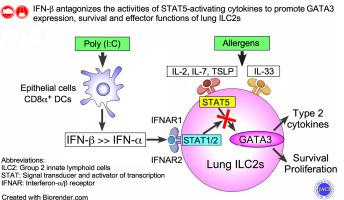Journal of Allergy and Clinical Immunology ( IF 11.4 ) Pub Date : 2021-08-21 , DOI: 10.1016/j.jaci.2021.07.041 Rinna Tei 1 , Koji Iijima 2 , Koji Matsumoto 2 , Takao Kobayashi 2 , Jyoti Lama 3 , Elizabeth A Jacobsen 4 , Hirohito Kita 4

|
Background
Group 2 innate lymphoid cells (ILC2s) are involved in type 2 immune responses in mucosal organs and are associated with various allergic diseases in humans. Studies are needed to understand the molecules and pathways that control ILC2s.
Objective
The aims of this study were to develop a mouse model that limits the innate type 2 immune response in the lung and to investigate the immunologic mechanisms involved in regulation of lung ILC2s.
Methods
Naive BALB/c mice were administered various Toll-like receptor agonists and exposed intranasally to the fungal allergen Alternaria alternata. The mechanisms were investigated using gene knockout mice as well as cultures of lung cells and isolated lung ILC2s.
Results
Polyinosinic–polycytidylic acid, or poly (I:C), effectively inhibited innate type 2 response to A alternata. Poly (I:C) promoted production of IFNα, -β, and -γ, and its inhibitory effects were dependent on the IFN-α/β receptor pathway. IFN-β was 100 times more potent than IFN-α at inhibiting type 2 cytokine production by lung ILC2s. Signal transducer and activator of transcription 5 (STAT5)-activating cytokines, including IL-2, IL-7, and thymic stromal lymphopoietin, but not IL-33, promoted survival and proliferation of lung ILC2s in vitro, while IFN-β blocked these effects. Expression of the transcription factor GATA3, which is critical for differentiation and maintenance of ILC2s, was inhibited by IFN-β.
Conclusions
IFN-β blocks the effects of STAT5-activating cytokines on lung ILC2s and inhibits their survival and effector functions. Administration of IFN-β may provide a new strategy to treat diseases involving ILC2s.
中文翻译:

TLR3 驱动的 IFN-β 拮抗 STAT5 激活细胞因子并抑制肺中先天性 2 型反应
背景
第 2 组先天性淋巴样细胞 (ILC2s) 参与粘膜器官中的 2 型免疫反应,并与人类的各种过敏性疾病有关。需要研究来了解控制 ILC2 的分子和途径。
客观的
本研究的目的是开发一种限制肺部先天 2 型免疫反应的小鼠模型,并研究参与调节肺部 ILC2 的免疫机制。
方法
给幼稚的 BALB/c 小鼠施用各种 Toll 样受体激动剂,并在鼻内暴露于真菌过敏原链格孢。使用基因敲除小鼠以及肺细胞培养物和分离的肺 ILC2 研究了这些机制。
结果
聚肌胞苷酸或聚 (I:C) 可有效抑制对A alternata 的先天 2 型反应。Poly (I:C) 促进 IFNα、-β 和 -γ 的产生,其抑制作用依赖于 IFN-α/β 受体途径。在抑制肺 ILC2 产生 2 型细胞因子方面,IFN-β 的效力是 IFN-α 的 100 倍。信号转导和转录激活因子 5 (STAT5) 激活细胞因子,包括 IL-2、IL-7 和胸腺基质淋巴细胞生成素,但不是 IL-33,在体外促进肺 ILC2 的存活和增殖,而 IFN-β阻断这些效果。IFN-β 抑制了对 ILC2 的分化和维持至关重要的转录因子 GATA3 的表达。
结论
IFN-β 阻断 STAT5 激活细胞因子对肺 ILC2 的影响,并抑制其存活和效应功能。施用 IFN-β 可能为治疗涉及 ILC2 的疾病提供一种新策略。











































 京公网安备 11010802027423号
京公网安备 11010802027423号